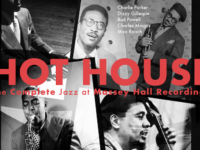Come on a journey with Charlie Parker. Hear the trials, the outtakes and the false starts of some of his most memorable tunes. The new two-disc Unheard Bird is an insight into the creative mind and genius which was Bird and, though it takes some listening, it is interesting as you get a sense of that seeking of elusive perfection which made Parker one of the great players.
“Okiedoke” is a gorgeous Latin theme, and here there are five takes with each one introduced as Take 1, Take 2 and so on by Charlie Parker. The tune settles into a Latin beat, over which Parker soars with some impressive improvisation pulling no stops with his technically brilliant scale ascents and descents. Take 1 is incomplete, Take 2 is longer, Take 3 is incomplete, Take 4 is longer again, Take 5 is the released version (found on the 1995 Verve collection South of The Border) and is well worth waiting for. “Visa” is in four parts, with the final version being the last. And so it goes with first takes and false starts of “Tune X,” “Tune Y,” “Tune Z.” (“Y” and “Z” finish with the master of the release “Passport.”) Track 25 is the released version of “If I Should Lose You,” and is a beautiful number, swinging, gentle and interpreted with emotive playing by Parker over the top of the strings, brass and percussion.
Track 28 is the released version of “Star Eyes” and, of course, Charlie Parker soars but there is also a piano interlude which is beautiful in itself and given ample space here. “Blues” has seven takes before the released version (Track 36), and the journey towards the perfection Parker sought is sensed as the takes, false starts and alternative takes are worked through. The “Bloomdido” false start (Track 37) is interesting for the interaction between the band and Parker, and Track 38 – which rounds of the first disc – is the released version from 1950’s Bird and Diz on Clef Records. There is interesting and almost aggressive interaction between the trumpet, drums and sax which makes this track stand out.
The second disc contains takes, false starts and final released versions of “An Oscar For Treadwell, “Mohawk,” “My Little Suede Shoes,” “Tico Tico,” “Fiesta,” “Mama Inez,” “Night and Day,” “Almost Like Being In Love” and “What Is This Thing Called Love.” The takes and false starts are here, along with final versions for release, and it is a journey listening to them all. Still, I am not quite sure what to make of Unheard Bird. There is a sense of releasing material which most studios may have discarded, along with released versions of the numbers which return the listener to familiar ground, but it is interesting to hear the interactions, coughs, splutters, odd bangs, whistles and sometimes strange musical interludes which appear on the outtakes and false starts.
What is good is that you get to experience all the takes, along with the improvisations, previously unheard, and can match these to the released versions – all of which are included for each track. So, appreciating the working process is made easier and the 21 masters of the releases provide context and a final understanding. For Charlie Parker fans and collectors, it is a door opening into his creative processes. It is not, however, a release for putting on and letting it play, more for listening closely, understanding the way Parker worked and his intensity and unstoppable energy whilst seeking perfection from both himself and band members.
In the end, Unheard Bird certainly provides insight into the creative process of one of the greatest players ever to pick up an instrument. It’s also clever, because the marketers know that many Parker followers will appreciate having more notes in their collection – even though, back when the industry had gatekeepers carefully controlling what the buying audience were offered, these takes would not have been on offer. The clever part was keeping and finding them.
Every take has a difference in the improvisation, and for the collectors these are good quality studio recordings by Verve totaling 58 previously unknown takes from 1949-52. On one or two of the false starts, it is difficult to hear why Charlie Parker stopped the take – but he knew when it wasn’t perfect and that’s what made him great. And so, this could well be a valuable addition to some collections, though others might find the sheer volume of tracks a little daunting.
- Wabi Sabi – ‘The Love Insane’ (2024) - March 24, 2024
- James McGowan Ensemble – ‘Reaching In’ (2023) - December 10, 2023
- Defne Sahin – ‘Hope’ (2023) - November 19, 2023




